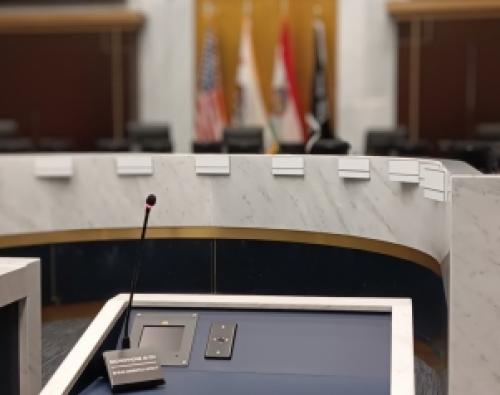The USDA has cut funding for two programs that allowed schools and food banks to purchase fresh food from local farms, also halting deliveries to food banks.
By G. A. McNeeley
March 21, 2025 (Washington, D.C.) - The U.S. Department of Agriculture (USDA) under the Trump administration has cut two programs that provided more than $1 billion to schools and food banks to purchase food from local farmers and ranchers.
About $660 million of those funds were contained in the Local Food for Schools Cooperative Agreement Program (LFS), which provided funds to schools and child care facilities.
The rest of those funds were part of the Local Food Purchase Assistance Cooperative Agreement Program (LFPA), which provided funds to local food banks and other organizations.
State officials were notified on Friday, March 7, of the USDA’s decision to end these programs this year. More than 40 states had signed agreements to participate in previous years, according to the School Nutrition Association (SNA) and several state agencies. The USDA also notified states that it was unfreezing funds for existing LFPA agreements, but did not plan to carry out a second round of funding for fiscal year 2025.
The Massachusetts Department of Agricultural Resources confirmed it was notified on March 7, that the 2025 funding would be terminated within 60 days.
These cuts come as Donald Trump’s second presidential administration has cut federal spending and imposed tariffs, which forced food organizations and farmers to cut staff and halt investments.
What Do These Programs Do?
"This program will strengthen the food system for schools and childcare institutions by helping to build a fair, competitive, and resilient local food chain, and expand local and regional markets with an emphasis on purchasing from historically underserved producers and processors," the USDA website says on the LFS program's page. The LFS program helped build new income sources for local farmers and food producers.
The LFS program was also expanded to include child care centers, which was announced by the USDA in December 2024. "Families can feel good knowing their kids are eating food that was grown right in their own community," said then-Deputy Under Secretary for Food, Nutrition and Consumer Services Cindy Long.
The goal of the LFPA program is to "improve food and agricultural supply chain resiliency," their website said.
LFPA agreements allow states, tribal and territorial governments to purchase food within their own communities (in the state itself, or within 400 miles of the food's destination). That food goes to food banks and organizations that feed people in "underserved communities," according to the USDA's website.
Both programs were introduced to respond to the impacts to the food supply chain brought on by the start of the COVID-19 pandemic, according to the USDA. By the end of 2024, food purchased through the program had been distributed at 7,900 food banks, food pantries, and communities in the U.S., the agency said.
In December 2024, the USDA announced a $1.13 billion investment for the programs. Of that funding, $471.5 million was slated for states and territories to "purchase local, unprocessed, or minimally processed domestic foods" to serve in schools participating in free or reduced-cost meal programs, and $188.6 million for child care centers participating in the Child and Adult Care Food Program.
Food banks have also been seeing demands (due to rising food prices) and Republicans in Congress are pushing to make significant cuts to the Supplemental Nutrition Assistance Program (SNAP).
What Are the Officials Saying?
“These proposals would cause millions of children to lose access to free school meals at a time when working families are struggling with rising food costs,” said Shannon Gleave, the president of the SNA, in a press release. “Meanwhile, short-staffed school nutrition teams, striving to improve menus and expand scratch-cooking, would be saddled with time-consuming and costly paperwork created by new government inefficiencies.”
Maura Healey, Governor of Massachusetts, criticized the Trump Administration for cutting programs that would’ve provided $12 million in food-related funding for schools and food banks in her state.
In a press release, Healey said, “Donald Trump and Elon Musk have declared that feeding children and supporting local farmers are no longer ‘priorities’, and it’s just the latest terrible cut with real impact on families across Massachusetts”.
“There is nothing ‘appropriate’ about it. Trump and Musk are continuing to withhold essential funding in violation of court orders, and our children, farmers and small businesses are bearing the brunt of it,” Healey added.
An unnamed USDA spokesperson told Politico that funding for the programs, “is no longer available and those agreements will be terminated following 60-day notification”.
The spokesperson also said, “These programs, created under the former Administration via Executive authority, no longer affect the goals of the agency. LFPA and LFPA Plus agreements that were in place prior to LFPA 25, which still have substantial financial resources remaining, will continue to be in effect for the remainder of the period of performance.”
ECM spoke with the San Diego Food Bank, and asked them how these cuts would affect their budget, as well as their ability to provide food to their customers.
Cole Williamson (Vice President of Administration), told us in an email, “At the SDFB, we do not know precisely how changes to USAID or other Federal programs will impact us. We are working with State and Federal officials to figure that out. We will continue to monitor the developing situation and adjust as needed.”
USDA Halts Food Bank Deliveries
On Wednesday, March 19, Politico reported that the USDA halted millions of dollars worth of deliveries to food banks without explanation, according to food bank leaders in six states.
The USDA had previously allocated $500 million in deliveries to food banks for fiscal year 2025 through The Emergency Food Assistance Program. Now, the food bank leaders say many of those orders have been canceled.
For the Central California Food Bank, that means a loss of 500,000 pounds of expected food deliveries worth $850,000 just for April through July, according to co-CEO Natalie Caples.
Caples says that she has not received any assurances from USDA on whether the delivery cancellations are temporary.
The money that was clawed back came from the Commodity Credit Corporation (CCC). It’s not clear how much of the $500 million for the emergency assistance program has been cut, but one USDA employee (granted anonymity to discuss private conversations), said the Trump administration has been trying to claw back CCC money that the Biden administration previously allocated in order to devote funds to other priorities.
USDA was supposed to spend $148 million of the $500 million this year to buy dairy products, eggs, blueberries and more. But last month, the department notified state agencies that it was canceling solicitations from suppliers, according to a February 20 email that Feeding America sent to its network of food banks (and was viewed by Politico).
“USDA has not yet announced plans to move forward with the canceled food orders,” the email states. “We believe the best approach is for network members to work through state agencies to obtain clarification from USDA.”
The emergency food assistance network gets its funding from a mix of money from the farm bill and through commodities USDA purchases. But the patchwork funding system has left the program unable to meet increasing hunger needs (especially during the Covid-19 pandemic and subsequent years of food inflation), anti-hunger advocates say.
The Biden administration responded to the demand on food banks by supplementing the emergency assistance funding with roughly $2 billion from the CCC fund in 2022 and 2023, then the additional $500 million in 2024.
Many of the organizations that rely on funding from the emergency assistance program were also receiving funding from the LFPA.
The clawbacks come as Congress is weighing shrinking the SNAP, which helps 40 million low-income Americans afford food. That could further exacerbate the pressure on food banks, which provide just one meal for every nine that SNAP supplies.
Sources:
https://www.theguardian.com/us-news/2025/mar/11/usda-cuts-food-banks-schools
https://www.politico.com/news/2025/03/10/usda-cancels-local-food-purchasing-for-schools-food-banks-00222796
https://www.usatoday.com/story/news/nation/2025/03/11/usda-food-bank-school-funding-cuts/82265217007/
https://schoolnutrition.org/sna-news/proposed-school-meal-cuts-prompt-nationwide-advocacy/
https://www.mass.gov/news/governor-healey-denounces-president-trumps-decision-to-cut-12-million-in-federal-funding-to-feed-children-support-local-farmers-in-massachusetts
https://www.politico.com/news/2025/03/19/usda-halts-deliveries-food-banks-trump-00239453?cid=apn





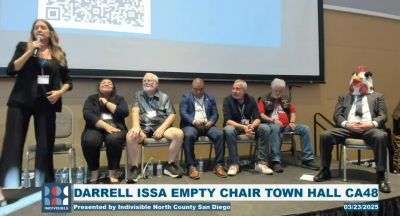 The panelists with Mills were Escondido Deputy Mayor Consuelo Martinez, Vista Unified School District Board Member Cipriano Vargas, Danny Jackson, Max Disposti (founder and Executive Director of the North County LGBTQ Resource Center) and Joe Houde. A man in a chicken mask reflected the group's claim that Issa is "chicken" for avoiding holding a Town Hall.
The panelists with Mills were Escondido Deputy Mayor Consuelo Martinez, Vista Unified School District Board Member Cipriano Vargas, Danny Jackson, Max Disposti (founder and Executive Director of the North County LGBTQ Resource Center) and Joe Houde. A man in a chicken mask reflected the group's claim that Issa is "chicken" for avoiding holding a Town Hall.
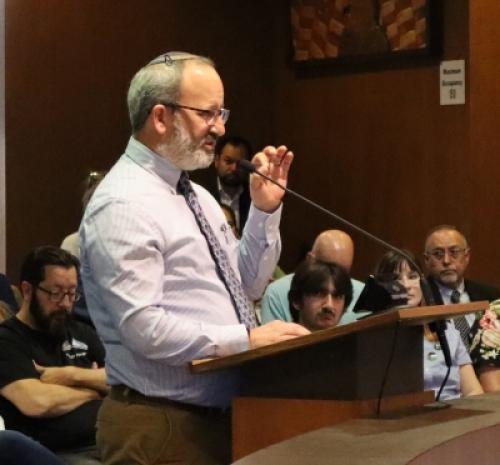
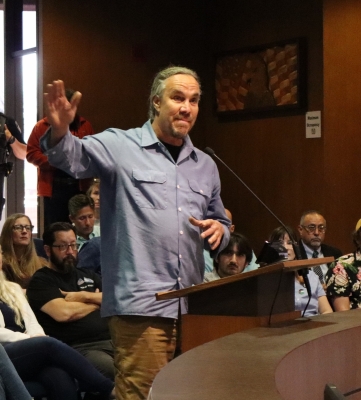 Public speaker Spenser Little (right) said he didn’t agree with the resolution and felt it was an unfair “application of language” and an attempt to stop criticism of Israel. He spoke of the city’s large number of refugees from the Middle East who have emigrated to America to get away from violence.
Public speaker Spenser Little (right) said he didn’t agree with the resolution and felt it was an unfair “application of language” and an attempt to stop criticism of Israel. He spoke of the city’s large number of refugees from the Middle East who have emigrated to America to get away from violence.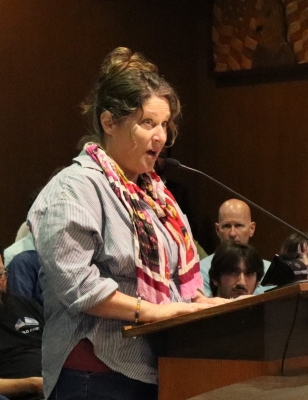 Speaker Tina Bernard (left), who said she converted to Judaism many years ago, said that those opposing this definition are doing it “because they want to continue their behaviors unchecked.”
Speaker Tina Bernard (left), who said she converted to Judaism many years ago, said that those opposing this definition are doing it “because they want to continue their behaviors unchecked.”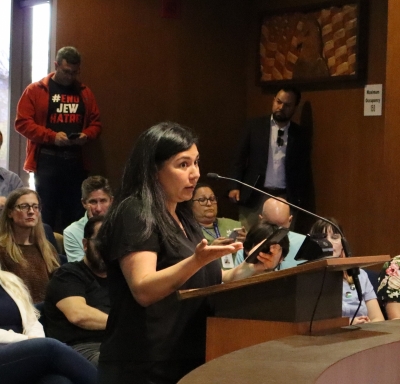 Julia Gomez (right), interim managing director of the ACLU of San Diego and Imperial counties, said her group had sent a letter to the City Council urging a no vote on the resolution on antisemitism.
Julia Gomez (right), interim managing director of the ACLU of San Diego and Imperial counties, said her group had sent a letter to the City Council urging a no vote on the resolution on antisemitism.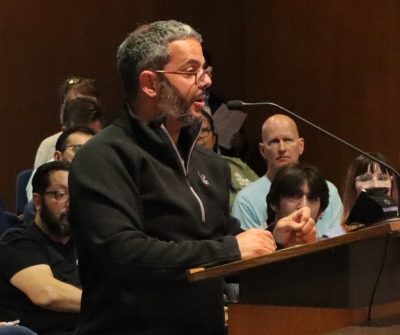 Alberto Mansur (left), a Mexican-American Jew, told the city council that “being a Jew is easy… until it’s not easy.”
Alberto Mansur (left), a Mexican-American Jew, told the city council that “being a Jew is easy… until it’s not easy.”